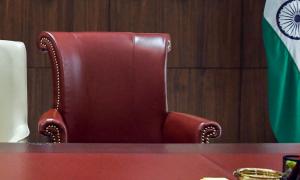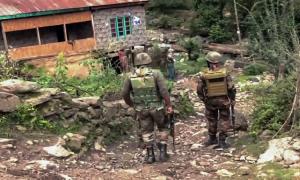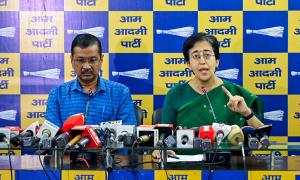The expulsion of Lok Sabha Speaker Somnath Chatterjee from the Communist Party of India-Marxist for defying the party diktat to step down ends on a bitter note the political journey of a man who was the Marxist outfit's most articulate face with liberal views in Parliament for nearly four decades.
The disciplinary action against someone, who was elected to the Lok Sabha 10 times on the party ticket beginning in 1971 and led the CPI-M parliamentary party for decades, must have come as an unnerving experience for a cadre-based party.
While Chatterjee's expulsion was in the offing after he refused to toe the party line of stepping down as speaker ahead of the trust vote, it was not the first time that the man, whose deep baritone voice, argumentative skill of the lawyer that he is and clarity on issues that has left a mark in the Lok Sabha, had differed with the party's official line.
Chatterjee, 79, was one of those in the party who had supported CPI-M patriarch Jyoti Basu's candidature for prime ministership in 1996, a move that was shot dead by majority hardliners in the party culminating in the "historic blunder".
Born in Tezpur in Assam on July 25, 1929, in a conservative family, Chatterjee's father was a Hindu Mahasabha leader.
Educated in Kolkata and England, Chatterjee obtained his post-graduate degree from the Cambridge and Bar-at-Law from Middle Temple, the UK, to become a lawyer.
It was in 1968 that he joined politics and the CPI-M and three years later he was elected to the Lok Sabha from his home constituency of Bolpur.
Gifted with debating skills and oratory power, Chatterjee excelled as a parliamentarian that saw him being propelled to the post of leader of CPI-M parliamentary delegation for the first time in 1989.
Chatterjee's eloquence puncuated by flashes of wit, clear perspective on national and international issues and command over the English language earned him the outstanding parliamentarian award in 1996.
Chatterjee had won all the Lok Sabha polls except once in 1984 when he suffered a shock defeat against the then Congress leader Mamata Banerjee in his traditional Jadavpur constituency, a CPI-M stronghold. That prompted him to shift to Bolpur constituency.
In an iron-curtain organisation like the CPI-M, where the principle of democratic centralism loses out to party fiat, Chatterjee has always been considered among a handful of persons with a little more liberal views and close to Jyoti Basu, not always hamstrung by ideological dogma.
It was because of this that Chatterjee was drafted by Basu during the 1990s to preside over West Bengal's industrial council as the Left Front government desperately sought private investment -- domestic and foreign -- despite militant trade unions of CPI-M.
Chatterjee may have antagonised the CPI-M leadership by not quitting the post of speaker, but this was not his first run-in with the party bosses.
Way back in 1992, the party had served him with a show cause notice and his the then party colleague Saifuddin Choudhury, another articulate speaker who was later expelled from the party, for alleged hobnobbing with Congress at a time when CPI-M's official line was maintaining equidistance with both Congress and BJP.
Given his mastery over parliamentary rules and regulations and oratorial skills acquired during his long years in the House, Chatterjee was but a natural and unanimous choice as the speaker after the May 2004 Lok Sabha elections.
A man of convictions and values, Chatterjee never hesitated when it came to speaking his mind whether within the party forum or outside on any issue.
As the speaker, Chatterjee has always acted with a sense of fairness and unflinching adherence to rules aimed at upholding the dignity of the Lok Sabha.
His firm handling of unruly MPs saw him deftly handling some of the most ticklish situations in Lok Sabha in the last four years, be it boycott of the House by opposition parties on the issue of office of profit or tainted parliamentarians.
He has repeatedly driven home the need for parliamentarians to behave responsibly in the House and uphold the dignity of Parliament.
A strong proponent of the independence of the legislature, Chatterjee had often been critical of judicial activism and did not hestitate to express his unhappines with the Supreme Court orders related to the controversial vote of confidence in the Jharkhand Assembly in 2005.
As the speaker, Chatterjee asked for a presidential reference to the Supreme Court under Article 143 of the Indian Constitution.
Chatterjee's brush with the CPI-M leadership on the issue of continuing in the post of speaker was the culmination of his propensity to stand up to pressure and hold on to the views he cherishes.
He believed that the speaker's post was above party politics and there was no reason for him to obey the party diktat to step down. It was precisely because of this that he quit the CPI-M central committee.
Chatterjee also reportedly conveyed to the CPI-M leadership his view that the party should not be seen voting with Bharatiya Janata Party against the Manmohan Singh government in the trust vote.








More from rediff